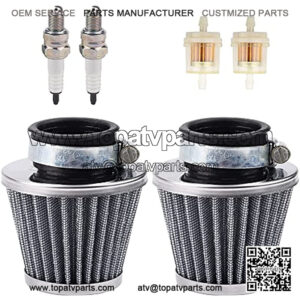Your car’s oil filter plays a critical role in removing contaminants from your motor oil. Clean oil in your lubrication system not only helps your engine perform better, but also protects it from engine wear.
Most vehicles will have one oil filter, a primary oil filter.
Some may have a secondary filter, which works separately. This is more common in a diesel engine as these produce more combustion contaminants that end up in the crankcase.
Your oil filter choice will come in grades from good to best, though any oil filter that fits will work.
If so, does it really matter which engine oil filter gets fitted?
It depends.
Here are some tips to help you decide:
Tip A: Match Your Driving Style
A premium oil filter may be a good fit for stop-and-go traffic — to cope with traffic jams that frequently cause more oil pressure variations than driving at a constant speed. The wrong filter might crack its bypass valve too often, pushing unfiltered oil into your engine.
High-performance filters would be for cars driven to the max. And if you’re a racer, it’d make sense to use a race filter that can handle those light engine oils.
Tip B: A Bigger Filter Isn’t Always Better
Just because a larger filter will fit your engine threads, doesn’t mean it’ll work better. It might have a less suitable filter media, bypass valve, or flow rate.
Follow manufacturer recommendations for efficient engine oil filtration, as the wrong filter will give you the opposite effect.
Tip C: Use A Good Engine Oil Filter For Synthetic Motor Oil
If you’re on an extended oil change interval or use synthetic oil, then reputable, upper-end filter brands (like a Fram oil filter or those from Motorcraft) are probably a good idea.
These premium filters will help maintain clean oil during those extended oil change intervals, or keep costly synthetic oil clean longer. The better the quality of an oil filter, the better its filtration efficiency.
However, if your car engine uses conventional oil and you stick to a regular filter and oil change schedule, the best filters aren’t necessary.
D: Use Synthetic Oil Filters For More Efficient Filtering
You don’t need a synthetic oil filter for synthetic oil — don’t get these mixed up.
The “synthetic” in synthetic oil filter refers to its filter media. It uses synthetic media instead of traditional pleated paper.
Synthetic media is generally better at trapping small particles for longer periods. It means more mileage on your engine oil before a change is needed.
If you’re thinking of using a synthetic oil filter, look for one that provides a 10,000 mile protection with around 98% filtration efficiency. Combine it with synthetic oil (rather than conventional oil), and you’ll have a duo that’ll go quite a distance!
You now know how to select an oil filter that’ll suit your needs.
Let’s go over some oil filter properties that may also have an impact on your choice.
4 Factors To Consider When Choosing An Engine Oil Filter
Here are 4 basic filter properties that affect how a car oil filter functions, whether for a gasoline or diesel engine:
1. Size And Capture Efficiency
Tiny particles that escape your air filter (like airborne sand and dust) will get into your lubrication system, eventually suspended in the engine oil.
A typical economy-grade oil filter will have 95% capture efficiency at 40 microns. This means that the oil filter will remove 95% of particles larger than 40 microns on a single pass. The remaining 5% gets through, with little to no performance for under 40 microns.
You’ll find premium oil filters that have filtration efficiency at 95% or better at 10 microns, and these can cost well over $10.
Here’s the interesting thing — about 80% of typical road dust is smaller than 25 microns, so investing in a premium oil filter might not be a bad thing, as smaller particles can generate more engine wear.
2. Dirt-Holding Capacity
If you have a clogged oil filter, the oil filter will trigger its bypass valve so the oil pump can push unfiltered oil through and prevent engine oil starvation.
The oil filter dirt-holding capacity tells how long it’ll last before going into bypass. This is particularly important if you plan an extended oil drain without a midpoint filter change, or if you drive in very dusty environments.
Diesel engine oil filters are typically larger with a higher holding capacity than gasoline engine oil filters because of their propensity to produce more soot.
Unfortunately, oil filter brands generally don’t detail dirt-holding capacity, so you’ll have to rely on changing the filter at the recommended intervals.
3. Pressure-Flow Profile
Your oil pressure gauge will show oil pressure rising as dirt accumulates until the bypass cracking pressure is breached.
Typical oil filters with an internal bypass valve will crack around 10-12 psid (pressure differential), allowing oil flow to resume.
However, the pressure-flow profile on aftermarket oil filters isn’t commonly available. You don’t need to worry, though, as oil filters are designed to perform within the practical limits of day-to-day service.
4. Design And Fabrication Integrity
Automotive filters aren’t just about their filtration media. The construction, design, and attention to detail in automotive filters are essential. Remember, oil filters can’t be tested for performance or structural integrity before they’re sold.
That said, a good oil filter will have a:
- Strong, burst-resistant canister
- Bypass valve that doesn’t weep at normal operating temperatures
- Flexible anti drainback valve to avoid back-pressure and cold temperature oil leak
- Strong filter element (filtration media) with supported pleats and tightly sealed seams
About Oil Filter
“atv oil filter”
“atv oil filter guide”
“atv oil filter cleaner”
“honda atv oil filter”

